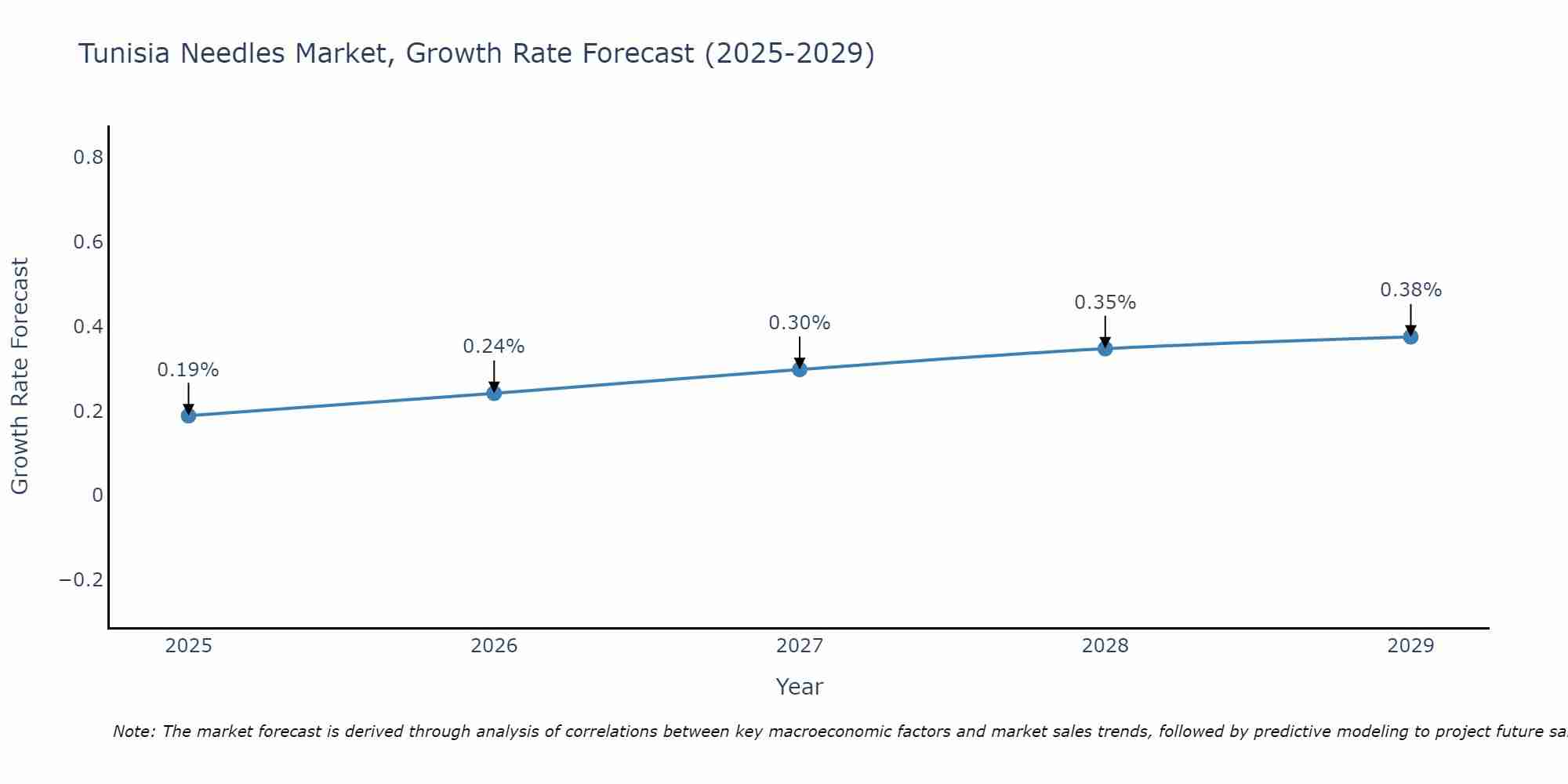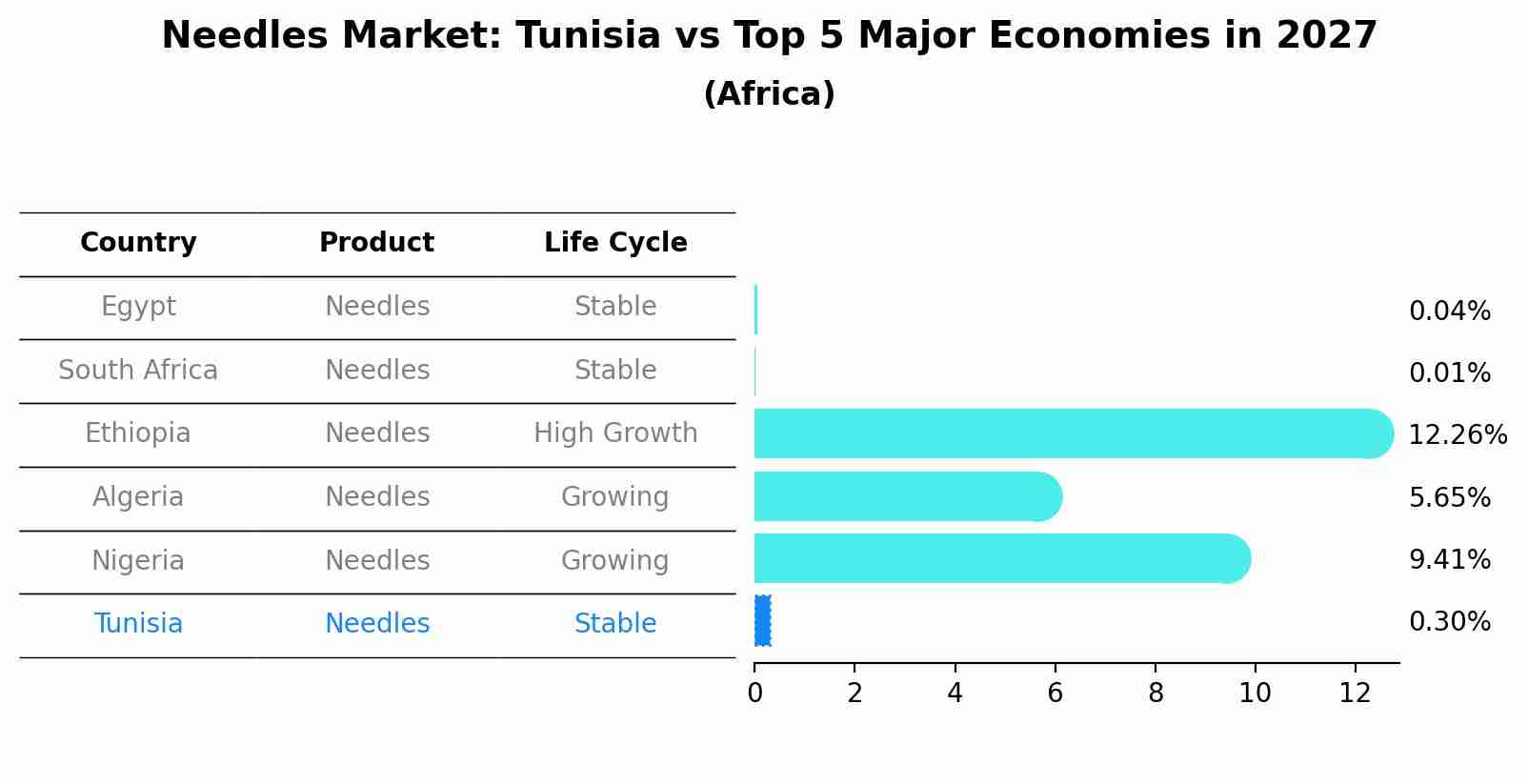Tunisia Needles Market Outlook | Analysis, Industry, Share, COVID-19 IMPACT, Size, Trends, Value, Growth, Companies, Forecast & Revenue
| Product Code: ETC376374 | Publication Date: Aug 2022 | Updated Date: Jul 2025 | Product Type: Market Research Report | |
| Publisher: 6Wresearch | Author: Dhaval Chaurasia | No. of Pages: 75 | No. of Figures: 35 | No. of Tables: 20 |
Tunisia Needles Market Size Growth Rate
The Tunisia Needles Market is likely to experience consistent growth rate gains over the period 2025 to 2029. Commencing at 0.19% in 2025, growth builds up to 0.38% by 2029.

Needles Market: Tunisia vs Top 5 Major Economies in 2027 (Africa)
By 2027, Tunisia's Needles market is forecasted to achieve a stable growth rate of 0.30%, with Egypt leading the Africa region, followed by South Africa, Ethiopia, Algeria and Nigeria.

Tunisia Needles Market Synopsis
The Tunisia needles market is a dynamic and growing sector within the healthcare industry, driven by factors such as increasing prevalence of chronic diseases, rising demand for minimally invasive procedures, and technological advancements in the field of medical devices. The market is characterized by a wide range of products including hypodermic needles, biopsy needles, suture needles, and spinal needles among others, catering to diverse healthcare needs. Key players in the Tunisia needles market include both domestic manufacturers and international companies, offering a competitive landscape. With a focus on quality, safety, and innovation, the market is poised for further expansion as healthcare infrastructure improves and awareness about the importance of safe medical practices continues to rise.
Tunisia Needles Market Trends
The Tunisia Needles Market is currently witnessing a shift towards the adoption of advanced technologies such as safety needles to prevent needlestick injuries and infections. There is a growing demand for specialty needles such as biopsy needles and pen needles due to the increasing prevalence of chronic diseases and the rising geriatric population. The market is also experiencing a trend towards the use of prefilled syringe needles for convenience and accuracy in drug administration. Additionally, there is a focus on the development of eco-friendly and sustainable needles to reduce environmental impact. Overall, the Tunisia Needles Market is evolving to meet the demands for safety, efficiency, and sustainability in healthcare settings.
Tunisia Needles Market Challenges
In the Tunisia Needles Market, a key challenge is the presence of counterfeit products, which can compromise product quality and safety. These counterfeit needles can pose serious risks to patients by causing infections or other complications during medical procedures. Additionally, the market may face challenges related to pricing pressure and competition from low-cost alternatives. Ensuring regulatory compliance and maintaining high quality standards are crucial for companies operating in the Tunisia Needles Market to build trust with healthcare providers and end-users. Moreover, the market may also encounter challenges related to distribution channels, including issues such as supply chain disruptions and logistics constraints, which can impact the availability of needles to healthcare facilities across the country.
Tunisia Needles Market Investment Opportunities
The Tunisia Needles Market offers promising investment opportunities driven by the growing demand for medical procedures and advancements in healthcare infrastructure. With a rising geriatric population and increasing prevalence of chronic diseases, there is a steady demand for needles used in diagnostics, drug delivery, and therapeutic interventions. Additionally, the expansion of healthcare facilities and government initiatives to improve healthcare access further contribute to market growth. Investors can consider opportunities in manufacturing and distribution of needles, as well as technological innovations such as safety-engineered needles. Collaborations with healthcare providers and strategic partnerships can also enhance market penetration. Overall, the Tunisia Needles Market presents a favorable investment landscape with potential for sustained growth and profitability.
Jordan Agar Market Government Policies
The Tunisian government has implemented various policies to regulate the needles market in the country. These policies include quality standards to ensure the safety and efficacy of needles used in healthcare settings. Additionally, the government has set guidelines for the import and distribution of needles to prevent counterfeit products from entering the market. The Tunisian Ministry of Health also works closely with manufacturers and suppliers to monitor the production and distribution of needles, ensuring compliance with regulations. Overall, these policies aim to safeguard public health by promoting the use of high-quality and safe needles in medical procedures while also preventing the influx of substandard products into the Tunisian market.
Tunisia Needles Market Future Outlook
The Tunisia Needles Market is expected to witness steady growth in the coming years due to the increasing prevalence of chronic diseases, rising geriatric population, and expanding healthcare infrastructure. Technological advancements in needle design and manufacturing processes are also anticipated to drive market growth by enhancing the safety and efficacy of medical procedures. Additionally, the growing demand for minimally invasive surgeries and the rising adoption of advanced medical devices are likely to further boost the demand for needles in Tunisia. However, factors such as pricing pressures, regulatory challenges, and competition from alternative drug delivery methods may pose potential challenges to market growth. Overall, the Tunisia Needles Market is poised for expansion, driven by evolving healthcare needs and advancements in medical technology.
Key Highlights of the Report:
- Tunisia Needles Market Outlook
- Market Size of Tunisia Needles Market, 2021
- Forecast of Tunisia Needles Market, 2031
- Historical Data and Forecast of Tunisia Needles Revenues & Volume for the Period 2018 - 2031
- Tunisia Needles Market Trend Evolution
- Tunisia Needles Market Drivers and Challenges
- Tunisia Needles Price Trends
- Tunisia Needles Porter's Five Forces
- Tunisia Needles Industry Life Cycle
- Historical Data and Forecast of Tunisia Needles Market Revenues & Volume By Type for the Period 2018 - 2031
- Historical Data and Forecast of Tunisia Needles Market Revenues & Volume By Conventional for the Period 2018 - 2031
- Historical Data and Forecast of Tunisia Needles Market Revenues & Volume By Safety for the Period 2018 - 2031
- Historical Data and Forecast of Tunisia Needles Market Revenues & Volume By Product for the Period 2018 - 2031
- Historical Data and Forecast of Tunisia Needles Market Revenues & Volume By Pen for the Period 2018 - 2031
- Historical Data and Forecast of Tunisia Needles Market Revenues & Volume By Suture for the Period 2018 - 2031
- Historical Data and Forecast of Tunisia Needles Market Revenues & Volume By Blood Collection for the Period 2018 - 2031
- Historical Data and Forecast of Tunisia Needles Market Revenues & Volume By Dental for the Period 2018 - 2031
- Historical Data and Forecast of Tunisia Needles Market Revenues & Volume By Ophthalmic for the Period 2018 - 2031
- Historical Data and Forecast of Tunisia Needles Market Revenues & Volume By Others for the Period 2018 - 2031
- Historical Data and Forecast of Tunisia Needles Market Revenues & Volume By Delivery Mode for the Period 2018 - 2031
- Historical Data and Forecast of Tunisia Needles Market Revenues & Volume By Hypodermic for the Period 2018 - 2031
- Historical Data and Forecast of Tunisia Needles Market Revenues & Volume By Intravenous for the Period 2018 - 2031
- Historical Data and Forecast of Tunisia Needles Market Revenues & Volume By Intramuscular for the Period 2018 - 2031
- Historical Data and Forecast of Tunisia Needles Market Revenues & Volume By Others for the Period 2018 - 2031
- Historical Data and Forecast of Tunisia Needles Market Revenues & Volume By Raw Material for the Period 2018 - 2031
- Historical Data and Forecast of Tunisia Needles Market Revenues & Volume By Stainless Steel for the Period 2018 - 2031
- Historical Data and Forecast of Tunisia Needles Market Revenues & Volume By Glass for the Period 2018 - 2031
- Historical Data and Forecast of Tunisia Needles Market Revenues & Volume By Others for the Period 2018 - 2031
- Tunisia Needles Import Export Trade Statistics
- Market Opportunity Assessment By Type
- Market Opportunity Assessment By Product
- Market Opportunity Assessment By Delivery Mode
- Market Opportunity Assessment By Raw Material
- Tunisia Needles Top Companies Market Share
- Tunisia Needles Competitive Benchmarking By Technical and Operational Parameters
- Tunisia Needles Company Profiles
- Tunisia Needles Key Strategic Recommendations
Frequently Asked Questions About the Market Study (FAQs):
- Single User License$ 1,995
- Department License$ 2,400
- Site License$ 3,120
- Global License$ 3,795
Search
Thought Leadership and Analyst Meet
Our Clients
Related Reports
- Afghanistan Apparel Market (2026-2032) | Growth, Outlook, Industry, Segmentation, Forecast, Size, Companies, Trends, Value, Share, Analysis & Revenue
- Canada Oil and Gas Market (2026-2032) | Share, Segmentation, Value, Industry, Trends, Forecast, Analysis, Size & Revenue, Growth, Competitive Landscape, Outlook, Companies
- Germany Breakfast Food Market (2026-2032) | Industry, Share, Growth, Size, Companies, Value, Analysis, Revenue, Trends, Forecast & Outlook
- Australia Briquette Market (2025-2031) | Growth, Size, Revenue, Forecast, Analysis, Trends, Value, Share, Industry & Companies
- Vietnam System Integrator Market (2025-2031) | Size, Companies, Analysis, Industry, Value, Forecast, Growth, Trends, Revenue & Share
- ASEAN and Thailand Brain Health Supplements Market (2025-2031) | Strategy, Consumer Insights, Analysis, Investment Trends, Opportunities, Growth, Size, Share, Industry, Revenue, Segments, Value, Segmentation, Supply, Forecast, Restraints, Outlook, Competition, Drivers, Trends, Demand, Pricing Analysis, Competitive, Strategic Insights, Companies, Challenges
- ASEAN Bearings Market (2025-2031) | Strategy, Consumer Insights, Analysis, Investment Trends, Opportunities, Growth, Size, Share, Industry, Revenue, Segments, Value, Segmentation, Supply, Forecast, Restraints, Outlook, Competition, Drivers, Trends, Demand, Pricing Analysis, Competitive, Strategic Insights, Companies, Challenges
- Europe Flooring Market (2025-2031) | Outlook, Share, Industry, Trends, Forecast, Companies, Revenue, Size, Analysis, Growth & Value
- Saudi Arabia Manlift Market (2025-2031) | Outlook, Size, Growth, Trends, Companies, Industry, Revenue, Value, Share, Forecast & Analysis
- Uganda Excavator, Crane, and Wheel Loaders Market (2025-2031) | Strategy, Consumer Insights, Analysis, Investment Trends, Opportunities, Growth, Size, Share, Industry, Revenue, Segments, Value, Segmentation, Supply, Forecast, Restraints, Outlook, Competition, Drivers, Trends, Demand, Pricing Analysis, Competitive, Strategic Insights, Companies, Challenges
Industry Events and Analyst Meet
Whitepaper
- Middle East & Africa Commercial Security Market Click here to view more.
- Middle East & Africa Fire Safety Systems & Equipment Market Click here to view more.
- GCC Drone Market Click here to view more.
- Middle East Lighting Fixture Market Click here to view more.
- GCC Physical & Perimeter Security Market Click here to view more.
6WResearch In News
- Doha a strategic location for EV manufacturing hub: IPA Qatar
- Demand for luxury TVs surging in the GCC, says Samsung
- Empowering Growth: The Thriving Journey of Bangladesh’s Cable Industry
- Demand for luxury TVs surging in the GCC, says Samsung
- Video call with a traditional healer? Once unthinkable, it’s now common in South Africa
- Intelligent Buildings To Smooth GCC’s Path To Net Zero


















